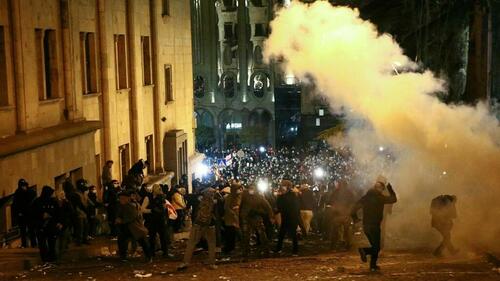In Tskhinval, attention was paid to the rash statement of the Georgian Prime Minister about the fictitious "occupation" of South Ossetia by Russia. Unfortunately, the rhetoric of the Georgian authorities testifies tothe predominance of emotions over common sense in Georgian politics.
Apologists of the western orientation of Georgia reiterate the so-called "occupation", since 1988. At first they called the Soviet Army" as the occupation" one, although they were one of its foundations, a union republic, an independent state within the USSR. After the collapse of the Soviet Union, Russian military bases began to be called the "occupation" troops, although they themselves signed an agreement on their deployment in Georgia. After the withdrawal of military bases, the Mixed Peacekeeping Forces in the zone of the Georgian-Ossetian conflict began to be called the "occupation" ones, although they were introduced in accordance with the interstate agreement between Russia and Georgia.
Thus, the words of the Georgian politician are not a true statement of the fact, but only a tribute to the habit or newfangled tendency to blame the USSR, and then Russia in various "occupations".
Surprisingly, one cannot hear the voices of the UN, OSCE and EU, which should remind the Georgian leader that during one of the rounds of the Geneva discussions, well-known international experts on international law were invited to the meeting.
At the insistence of the South Ossetian and Russian delegations, the Georgian representatives for a few hours were bringing their arguments to the experts, but they recognized that none of the charges brought by the Georgian side in international law were considered to be a sign of occupation. Following the hearings, it was publicly stated that: a) there is not a single sign of occupation in South Ossetia; b) The Russian Federation had not committed a single action, similar to the occupation.
Further, the leader of Georgia declares that "there is no ethnic conflict in the occupied territories of Georgia". On the issue of "occupation" we have already clarified the situation. It is clear that there is no any occupation, but Bakhtadze persistently calls South Ossetia as the occupied. So, it's amazing that Bakhtadze calls South Ossetia the "occupied", but claims that there is no ethnic conflict in the "occupied" South Ossetia. How can this be understood? In all the occupied territories there is an ethnic conflict. In Afghanistan, in Iraq, in Syria, in Libya, etc. there are occupation troops of the United States and their satellites, and interethnic and interreligious wars and bloodshed do not abate there. This is seen every day on TV, heard on radio, read in newspapers and on websites. If there is no ethnic conflict in South Ossetia, then there is no occupation.
The Prime Minister of Georgia, speaking of the absence of ethnic conflict in South Ossetia, willingly or unwillingly makes a good compliment to the leadership of the Republic of South Ossetia for a competent interethnic policy aimed at respecting the legitimate rights and interests of the peoples living here. Here, of course, he is right.
A good illustration of this is the Constitution (Basic Law) of our country, according to which the Russian and Ossetian languages are state languages, and Georgian has the status of official.
It would be useful for Bakhtadze to realize that in tiny South Ossetia, thanks to a reasonable interethnic policy and an easy-going, non-conflicting nature of the Ossetian people, there is a place for three status languages, and in large Georgia only for one single language.
By his statement, the Prime Minister of Georgia recognizes the following. In the recent past, when Georgian power extended to the territory of South Ossetia, there arose an inter-ethnic conflict, which led to the loss of Georgian power over the territory of South Ossetia, as a result of the disappearance of the Georgian authorities, the interethnic conflict also disappeared. Hence the logical conclusion that the interethnic conflict and the subsequent aggression of 1989-1992, the military intervention of 2004, the shelling of 2004-2008 and the full-scale military invasion of 2008 were planned and implemented by Georgia.
These events occurred at a time when Georgia was confident of Russia's non-interference when there were no Russian troops on the territory of South Ossetia in the amount to resist the Armed Forces of Georgia. However, the absence of Russian troops did not prevent Georgia from wailing about the "Russian occupation" in those years.
The Prime Minister of Georgia recognizes that there is no any inter-ethnic conflict in South Ossetia, and calls it a catastrophe. On the one hand, he is right. For him and others like him, the absence of conflicts and wars is a real catastrophe. There is no inter-ethnic conflict and there are no armed actions, which means that the government of Georgia has fewer opportunities to beg money from the West, fewer opportunities to steal money allocated for war. And we know that under Saakashvili in the government of Georgia, the money allocated for the war against South Ossetia was well divided among themselves. There was even a good, such tasty scandal when boxes with stones instead of shells and zinc with sand instead of cartridges were sent to the front against us, because their contents were sold to criminal elements, and the money divided among themselves. At the Georgian forums on the Internet, it was also said that not all the money allocated to the families of the Georgian soldiers killed in the war against us reached its destination. Bakhtadze, losing the remnants of self-control, also lies about the population in South Ossetia. This is reminiscent of Saakashvili's lies on the same topic. Saakashvili in 2008 claimed that there were only 1,500 people living in South Ossetia, and that they were all bandits, because the. civilians long escaped from South Ossetia had. And Bakhtadze has said that there are 13,000 people in South Ossetia (minus allegedly 7,000 Russian servicemen). What that it means? Progress? During the "occupation" the population of the "occupied" state increased eight and a half times?
The Prime Minister also lies about the population of the South Ossetian Autonomous Region according to the 1989 census (there were 99,000+, and he said 200,000) and the population in our days.
I would like to remind him of some demographic figures from the recent history of his Georgia. According to the National Statistical Service of Georgia, in 1992 the population of Georgia was 5 467 400 people. And in 2018 - 3,729,600. During the period of "independence" the population of Georgia decreased by 1,737,800 people. I want to ask the Prime Minister of Georgia, what did you, the Independents, have done with these people?
According to him, as part of the response to the "humanitarian catastrophe", the Georgian authorities developed the "Step to a Better Future" initiative. I advise them to apply these steps to their own population so that it does not run frightfully away from the fascist governments of Georgia (whoever would head them in the post-Soviet years), low salaries, high taxes, biting prices and other genocidal conditions created by the rulers, primarily for the blatantly deceived Georgian people.
The lie about "occupation" is intended for those who do not know the situation in South Ossetia, for those who do not follow the Geneva discussions and those who are not sufficiently qualified in international law issues.
It's a pity that a man who does not shun such a gross lie to work for his anti-Russian partners overseas is a prime minister of Georgia. Is there any reason to believe that he avoids it in domestic affairs?
It's also a pity that the Georgian people, who, apparently, will be fed by such weighty noodles for a long time, making it cannon fodder in foreign senseless wars, which Georgia is waging far beyond its borders, and who will long remember with sadness those blessed days of a comfortable life that the current rulers of Georgia call the "Soviet occupation."
Inal Pliev for IA "Res"






